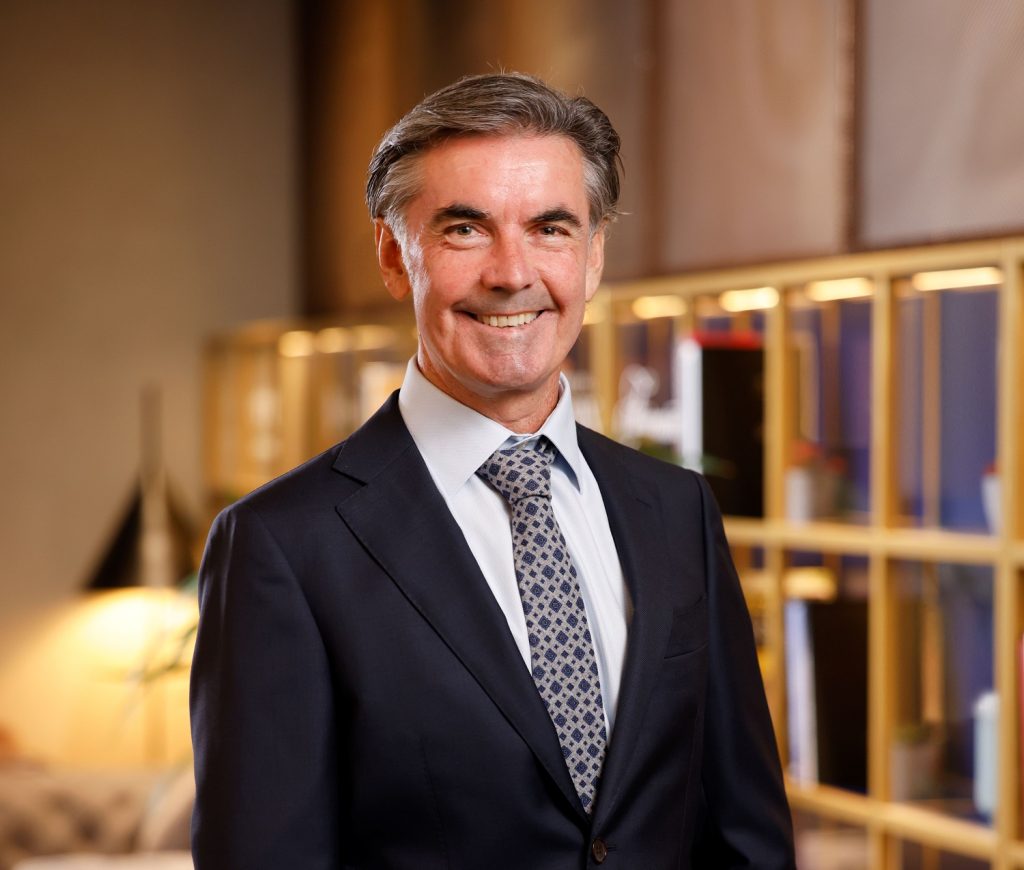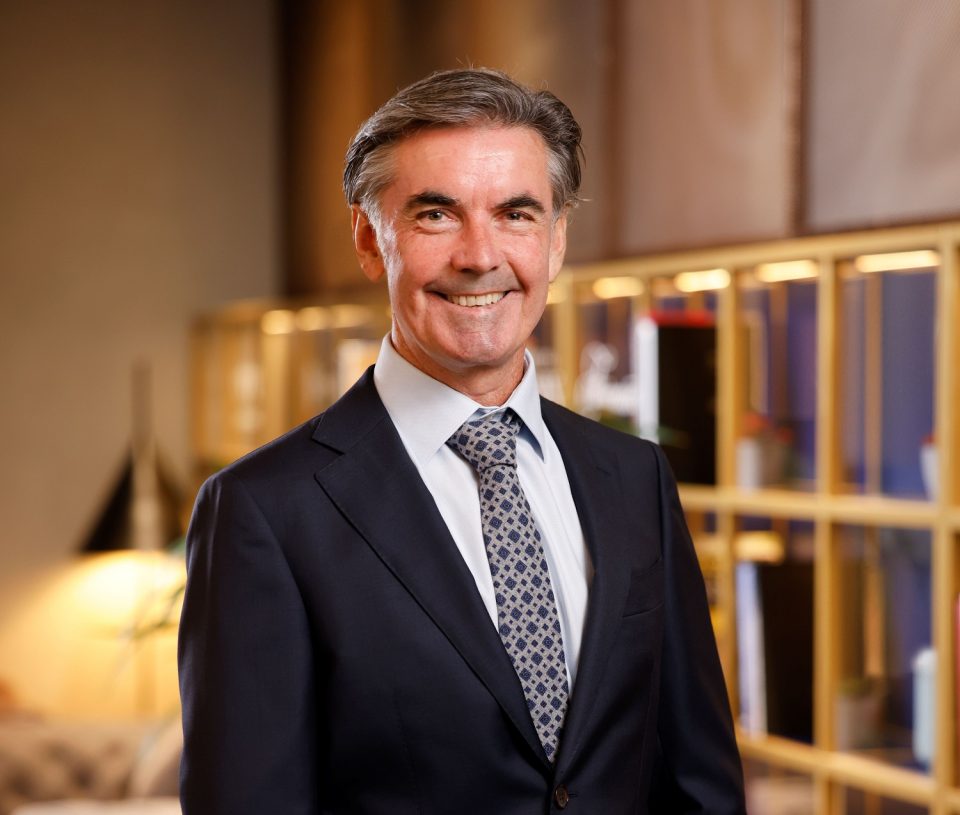Rihlat Travel News sat down with Paul Stevens, Chief Operating Officer – Middle East, Africa, Türkiye for the Premium, Midscale & Economy Brands at Accor, to delve into the group’s dynamic footprint across the region and the evolving hospitality landscape.
With more than two decades at Accor, Paul brings a depth of experience and a clear vision for sustainable, purpose-driven growth. He shares valuable insights into market trends, new hotel developments, branded residences, sustainability commitments, and explains how Accor is supporting its 22,000+ team members across a diverse network.

Accor has seen considerable growth across the Middle East and surrounding regions in recent years. Can you talk us through some of the key development trends, investment shifts, and standout markets driving this momentum?
We’re in a period of real momentum across the Middle East and surrounding markets, and it’s exciting to see how quickly things are evolving. We’ve had a couple of really strong years, and that momentum continues to build. While we started from a relatively modest base, this region has always been driven by luxury and large-scale developments – historically, led by luxury, and that remains very present today.
There’s strong appetite from both developers and owners to invest in high-end projects, but what’s exciting now is how that appetite is expanding beyond luxury. As the market matures, we’re seeing increasing interest in premium, midscale, and even economy segments driven by demand, diversification, and long-term value.
We’re seeing a more diverse wave of investment, not just from individuals, but also from corporate and institutional investors. These groups are looking for returns and seeking trusted international operators and brands that fit the premium segment. Premium is in fact, our largest segment across over 110 hotels in the MEA, and we continue to maintain those properties at a very high standard.
Saudi Arabia has been a major focus in the recent years, particularly in line with Vision 2030 investments. The country is backing this vision with significant developments, especially flagship properties in iconic locations. While much of this growth has been in the luxury space, cities like Riyadh and Jeddah are also seeing demand for a broader mix of accommodation options.
Türkiye is another market where we’ve built a strong foothold. We’re well respected there, thanks to our strong relationships with owners and our hands-on approach. We’ve invested in local leadership and spend a lot of time with our team there. We are one of the only companies that have a management team on the ground with about 16 people supporting nearly 60 hotels and that proximity to owners and operations has made a real difference.
Across the region, there’s a healthy pipeline of new developments What’s shifted is the mindset: Leisure demand is growing fast, particularly from free independent travellers, and more developers are increasingly turning to branded hotels to help drive distribution and performance. That’s led to a rise in conversions, as well as new builds and takeovers.
The real standout over the last 12 months has been Egypt. Historically, it performed steadily and considered as an affordable destination. But recently, we’ve seen a surge in interest, driven in part by strategic investment from GCC countries. There’s been a contagious uplift across the country from the new capital city to revitalised areas along the Nile and both coastlines.
There’s a desire from the Egyptian government to boost hotel inventory and re-establish Egypt’s global tourism position. Egypt has all the ingredients: with its rich history and cultural heritage, stunning coastlines, and large domestic population, the potential is huge. It offers travellers something unique, if you go to the capital city, you’ll get a real deep cultural experience, but when outside it you can do some local things and enjoy the local environments. It really offers the best of both worlds.
Can you share some of Accor’s most exciting recent openings and upcoming signings across the MENA region and what makes them significant in the broader growth story?
One of our most exciting upcoming openings this year is Swissôtel Doha Corniche Park Towers in Qatar which is a landmark project in the vibrant West Bay district, bringing hotel and residential living together across two iconic towers. Each of the 200 guestrooms, 142 serviced apartments, and 121 branded residences offer unobstructed views of the Arabian Gulf and the city’s historic quarter. located in the West Bay district.
It’s one of the most elevated Swissôtel properties we’ve developed and a flagship which is part of a striking mixed-use development featuring offices, residences, and the hotel itself. This flagship is a bold statement for the brand and a significant milestone for us in the region.
In Dubai, we’ve recently rebranded and consolidated three existing hotels in the Deira district into a unified cluster, now comprising a total of 999 rooms. These properties were acquired and repositioned under the Accor portfolio, creating a strong foothold for us in a strategic area of the city. The result is a diversified offering that caters to a wide range of travellers, from budget-conscious guests to those seeking a midscale experience.
Another major highlight for us has been the continued expansion of Mantis brand, which came into our fold toward the end of last year. Known for its conservation-first ethos, Mantis has traditionally focused on wildlife and environmental preservation in Africa. Now, the brand has evolved to encompass ocean and bird conservation as well.
One of our standout openings has been Hawar Resort by Mantis in Bahrain, which is a 100+ room eco-luxury property located on Hawar Island, a UNESCO-recognised natural habitat for both land and marine wildlife. It’s a pristine location with nothing else on the island, and offers a deeply immersive and nature-centric guest experience. The property has performed exceptionally well in its first few months.
We’re also excited about Saij Mountain Lodge by Mantis , located in the mountains of Ras Al Khaimah, about an hour from Dubai. This property is designed as a sustainable mountain retreat, and is a bit like visiting the moon, where the landscape is incredibly rugged and amazingly unspoilt. A unique feature being introduced there is a focus on ancient farming practices, integrating elements like animal care and beekeeping to connect guests to traditional ways of living, all while highlighting conservation and sustainability.It’s about slowing down, reconnecting with nature, and offering something genuinely different.
How has Accor’s purpose evolved, and how does it influence decision-making and day-to-day operations across the group?
I’ve been with Accor for well over 20 years, and I can say that the idea of “purpose” has become more central to our company than ever before.
About 18 months ago, a group of us gathered in Paris for a purpose-defining workshop. Our CEO told us, “We need to clearly articulate what we stand for.”
What followed was a robust process that involved reviewing over 5,500 verbatim submissions from people across the organisation that gave feedback on what our purpose should reflect. From that, with the help of some smart AI tools and expert consultants, we distilled it all down to a single, powerful statement: “Pioneering the Art of Responsible Hospitality, Connecting Cultures, with Heartfelt Care”
This statement is now our compass. It’s global, but flexible to guide all 45+ of our brands and regional and corporate teams. It gives everyone, from hotel teams to head office, a simple question to ask before making any decision: “Does this align with our purpose?” If the answer is no, then it sparks reflection and discussion.
With 330,000 team members worldwide making daily decisions, we needed something unifying, beyond the brand itself, and this purpose does exactly that.
What’s especially exciting is how it’s brought to life at the hotel level. Each hotel takes an element of this purpose and activates it through real initiatives. Every department gets involved, often in fun, competitive ways, always trying to outdo each other in how they interpret and embody our purpose.
Here in our region, with over 250 hotels and 22,000 team members it’s something our people experience and contribute to weekly, sharing their stories and ideas across the network. Ultimately, our purpose has given us clarity. It’s easy to communicate, it inspires our teams we call Heartists® which stands for Heart + Artists, and it gives genuine meaning to what we do each day.
How does Accor ensure its team members feel heard and supported across such a large network and diverse region?
Many of the people you meet at Accor have been with the company for a long time, and not just at the leadership level. Even at our hotels, we’re fortunate to have passionate, committed people who really drive the business on the ground. While we do have healthy changes in leadership to keep perspectives fresh, what remains consistent is our deep respect for our teams.
A big part of that is about listening. We don’t want to mould people into something they’re not. We want them to bring their personalities to work.
One of the most powerful tools we have is our regular team survey, which we run two to three times a year. Every single hotel team member, from frontline staff to General Managers, is invited to share feedback through a set of around 20 questions. Some questions are standard, like “Would you recommend Accor to a friend?” or “Are you satisfied with the training and support you receive?”, while others are more tailored to specific issues or regional trends.
What matters is what we do with that feedback. We then identify the top 3-4 trends from the responses and report back to our teams. It’s not just a corporate review, It’s a two-way conversation. We ask them to discuss the feedback internally, just as we do with our leadership team, and together we come up with ways to improve before the next survey.
One important insight we’ve uncovered through this process is where there are gaps in training or development opportunities, especially at certain levels of the business that we may not have seen without this feedback.
Beyond the surveys, we stay close to the teams through regular roadshows and regional gatherings like our upcoming training and development trip in Türkiye. These are hands-on, immersive sessions where we meet one-on-one with team members, visit properties, go behind the scenes, and ensure we stay connected to the real day-to-day of our hotels.
Branded residences have been gaining momentum globally. What’s driving this growth, and how is Accor responding to the demand?
Branded residences have really become a global phenomenon. While the concept originated in the United States, since then, we’ve seen a steady growth in the region as developers begin to recognise the value of aligning with trusted international hospitality brands like Accor.
One of the main reasons for their success is consumer confidence. Buyers feel reassured when they invest in a residence that carries a global brand name like Accor. They know the construction, design, and overall quality won’t be compromised. Equally important, once the development is complete and handed over, Accor continues to play a role in the ongoing management and maintenance, ensuring long-term consistency and service standards. That’s a major advantage compared to standalone developments.
We’ve now reached a point where branding goes far beyond hotels. You’re seeing branded residences associated with luxury cars, fashion houses, even national television networks and watchmakers. It’s quite extraordinary how far the concept has evolved.
From a development standpoint, the numbers speak for themselves. Developers can often achieve a 15% to 40% premium on branded residences compared to non-branded equivalents, depending on the location. Today, many of the developers we’re working with are actively seeking partnerships with established international brands rather than creating something from scratch under their own name.
Accor is very active in this space, we’re proud to have introduced Swissôtel Waterfront Residences at Dubai Islands the world’s first standalone Swissôtel branded residences on Dubai Islands, scheduled for 2027. We have also recently signed Swissôtel Residences Ras El Hekma in Egypt which reflects the growing appetite for these offerings.
With the rise of middle-class travellers across key markets, how is Accor responding to the growing demand for midscale accommodation in the region?
We’ve seen this trend emerge in other parts of the world, particularly in Asia-Pacific. In markets like Japan, South Korea, and China, travel patterns often begin with small, exploratory trips, then, over time, travellers become more confident and start spending more, eventually even purchasing property or investing in longer stays.
We’re starting to see a similar evolution in the Middle East. India is shaping up to be a major inbound source market, and we’re preparing accordingly. We’ve recently strengthened our partnership with IndiGo, India’s preferred airline,, and formalised the relationship more than ever before to collaborate and offer unique travel and hospitality benefits to our loyalty program members. We’re using loyalty databases to target both inbound and outbound travellers, and this will be a key driver of midscale growth.
Beyond India, we’re also seeing positive momentum from Pakistan and Bangladesh. These are significant markets with large populations and rising middle classes that have historically been under-recognised. As these economies strengthen, travel demand is set to grow, and we see real potential for growth from these regions.
We’ve also re-engaged with China, bringing it back into the fold. We’re keeping a close eye on how the upper-midscale travel segment develops there, as this will determine how we shape our brand presence and commercial strategies in the years to come.
Lastly, in the Middle East, our recent partnership with Emirates adds another layer to our loyalty strategy. The two-way conversion model between Emirates Skywards and ALL Accor’s loyalty programme is a great tool for both inbound and outbound travellers, offering them added flexibility and more rewarding experiences whether they’re flying or staying with us.
Sustainability and social impact are major focuses for Accor. Can you share some of the initiatives and progress being made across both environmental and community fronts?
Absolutely. At Accor, sustainability and social impact aren’t just commitments—they’re deeply tied to our purpose: to care for our people, our guests, and the places we operate in. Sustainability has two key pillars for us; first, there’s the environmental side, which is highly visible to guests and teams alike, and second there’s the social and community side, which is just as important, especially across our region.
On the environmental front, we’ve made strong progress. One of the most challenging steps was establishing our baseline data. Once we had that in place, we were able to measure and track reductions in things like energy use and carbon emissions. We’ve also taken real action on eliminating single-use plastics and reducing our overall footprint.
Food waste became a major focus shortly after, and we’ve since introduced new programs that promote seasonal sourcing and local suppliers, as well as working with organisations to increase plant-based offerings on our menus. It’s about giving guests the power of choice while encouraging more sustainable habits. Today, 85% of our hotels are actively monitoring and cutting food waste, with 100% baseline coverage in the UAE and 84% in Saudi Arabia. That’s a real step forward in tackling F&B waste at scale.
We have also reached a significant milestone in Accor’s sustainability journey, with more than 200 hotels now eco-certified (including L&L) reinforcing our commitment to responsible hospitality and providing a robust operational framework rooted in circular economy practices, efficient resource use, and climate resilience.
But equally important is our community and social responsibility. With 22,000 team members across the region, many of whom have families and ties to wider communities, the education we provide such as not using plastic plates or pouring oil down the sink has a ripple effect. That knowledge often spreads to five, ten, twenty times more people beyond the hotel walls. We truly feel that we’re making a meaningful difference, not just for our guests but for the communities that surround us.
Lastly, one of the programs Accor is most proud of is “Connecting Our Cultures”, which celebrates the diverse backgrounds of our teams. A standout expression of this is our Choir Games, a vibrant initiative involving song, dance, storytelling, and cultural exchanges. It brings our people together, allows them to express their heritage, and creates moments of real joy and connection across our network.
There are so many heart-warming stories to share as part of this initiative. I’m incredibly proud of how far we’ve come. But even more exciting is how much more we can achieve, together, in the years ahead.



